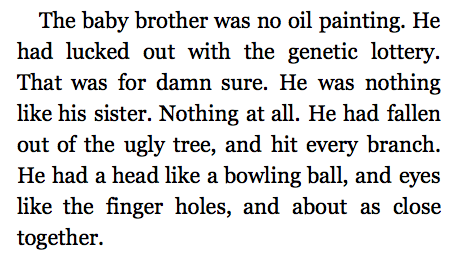Archive for October, 2011
Buy our warmed-over grande supremo soda
Psycholinguist Craig Chambers sent me this photo that he snapped recently inside a large pharmacy chain store (you know the kind, where you can avail yourself of all your better-living-through-chemicals products under one roof, whether it's anti-depressant, cough syrup, your favorite crunchy snack of Olestra and yellow dye #6, jet printer ink, or the entire range of household plastics.)
Along with the photo, Craig wrote:
If you ever find yourself rubbing shoulders with an executive from Shoppers Drug Mart, you might tell them that they could use your expertise in
(a) language for in-store advertising
(b) scalar adjectives
(c) both of the above
Read the rest of this entry »
Pinyin in practice
I just passed through security at the Xi'an airport (in northwest China) and was surprised to have my belongings searched by a young woman on whose snazzy black uniform, instead of an ID number as a regular worker would have, there was a label that said only SHIXI ("in training; practice"), with no trace of the corresponding characters 实习 anywhere about her. When I read out the pinyin with correct pronunciation and indicated that I knew immediately and exactly what it meant, the young woman and her co-workers were obviously pleased that I could do so.
Even more thought provoking is the fact that many Chinese police cars and uniforms have written on them GONGAN ("public security") rather than "police", and sometimes not even 公安.
Read the rest of this entry »
Political voices
Like other regular readers of Andrew Sullivan's web log, I was not surprised that he was happy about Sarah Palin's decision not to run for U.S. president in 2012. However, one aspect of his commentary ("Rejoice!", 10/5/2011) did surprise me. The puzzle is in the second sentence:
Our Three Year National Nightmare Is Over!
Palin talks to Mark Levin here (her voice is the deeper one).
Mark Levin is a radio talk show host, and Sullivan's link goes to a page on Levin's web site that includes not only the text of Palin's statement, but also accesses an mp3 file of a 15-minute segment of his show. My interest here, of course, is not in the politics but in the phonetics. Is it really true that Sarah Palin's voice is deeper (i.e. lower in pitch) than Mark Levin's?
Read the rest of this entry »
More lucking out
As discussed at length in "Lucking out" (10/8/2011), luck out is a well-established American idiom meaning "to succeed through good luck". But it's not all that common — about one in ten million words in COCA — and even a few Americans seem to be be a bit uncertain about its meanings, confused into thinking that luck out might actually mean "to fail through bad luck" (perhaps by echoes of "out of luck" or idioms like "ground out" or "drop out"). This idea is substantially more widespread in other parts of the English-speaking world, and perhaps has a significant proportion of mindshare in Australia; in any case, it caused the British novelist Lee Child to make an uncharacteristic mistake by using the "fail through bad luck" meaning in interior monologue attributed to his American hero, Jack Reacher.
But in the course of writing that earlier post, I came across a curious claim. According to the entry on luck out in Merriam-Webster's Dictionary of English Usage, the 1985 Harper Dictionary of Contemporary Usage (2nd ed.) claimed that
. . . luck out was commonly used during World War II in some such sense as "to meet with bad luck; run out of luck," as in describing a soldier who was a casualty of battle ("He lucked out") or a poker player who lost his chips.
The editors of MWDEU note that "we have collected almost no evidence of the older sense cited by Harper", and add that "The little evidence we have showing luck used as a verb during World War II is suggestive of good luck, not bad".
If there really were an old U.S.-military-associated negative-valence luck out idiom, that would make Child's novelistic use more plausible, since Reacher is an army MP who was (fictionally) born around 1959 and raised in a military family on U.S. bases around the world. But I've done a bit more poking around in historical sources, and all the evidence I've found confirms MWDEU's suggestion that no such idiom ever existed.
Read the rest of this entry »
Genius
It's not just young people who are apparently losing the ability to produce and interpret cursive writing. I missed a striking example a few months ago when a reporter for the Daily Mail demonstrated ignorance of the standard way to write a cursive capital "G" ("Some 'genius'! Suspect on assault charge pictured with misspelt tattoo", 2/4/2011):
It's wrong on so many levels.
As if covering your face with ugly DIY tattoos wasn't a dumb enough thing to do, this suspect in an assault case even managed to misspell the one that runs right across his forehead.
Jerome Smith had the word genius written with a 'j' instead of a 'g'
Read the rest of this entry »
Altar Ego
Patrick Howley ("Standoff in D.C.", The American Spectator 10/8/2011) describes his activities as a journalist and agent provocateur at the OWS protests in Washington D.C.:
The fastest-running protesters charged up the steps of Washington's National Air and Space Museum Saturday afternoon to infiltrate the building and hang banners on the "shameful" exhibits promoting American imperialism. As the white-uniformed security guards hurried to physically block the entrances, only a select few — myself, for journalistic purposes, included — kept charging forward. […]
Minutes earlier, I had been among those blocking major D.C. roads chanting "We're unstoppable" — and from beneath my unshaven left-wing altar ego, I worried that we might actually be. But just as the lefties couldn't figure out how to run their assembly meeting (many process points, I'm afraid to report, were left un-twinkled), so too do they lack the nerve to confront authority. From estimates within the protest, only ten people were pepper-sprayed, and as far as I could tell I was the only one who got inside the museum.
Read the rest of this entry »
A double ration of something
Readers of yesterday's discussion of lucking out may wonder what Jack Reacher, a somewhat eccentric man of action, would think of an extended discussion of his lexical choices. For a clue, if not an answer, we can turn to a passage in the same novel where he learns some crucial information from an old MP colleague named Stan Lowrey. Reacher had earlier asked Lowrey to make unofficial inquiries about a woman named Audrey Shaw, whose fingerprints were found in the house of one of the women murdered in The Affair.
Read the rest of this entry »
Dictionary dick
Bert Vaux posted this on his Facebook wall, "From Ed Pulford's recent trip to Silk Road towns in Southern Xinjiang":
Read the rest of this entry »
Lucking out
In Lee Child's recent novel The Affair, Jack Reacher visits the home of Shawna Lindsey, one of three beautiful young women who have been brutally murdered, and meets the victim's younger brother. Reacher's interior monologue goes like this:

Read the rest of this entry »
"So what if/that…"
From the AP wire…
ARLINGTON, Texas (AP)—So what that the Texas Rangers won their only game this season against Detroit Tigers ace Justin Verlander.
This sentence tripped me up in a couple of different ways. First, I initially had trouble parsing the subordinate clause, "the Texas Rangers won their only game this season against Detroit Tigers ace Justin Verlander." Now, obviously it doesn't mean that the only game this season that the Rangers won was against Verlander. For a little while, I thought it was a muddled way to say that the only game this season that the Rangers won against the Tigers was against Verlander. Eventually, I got it: the only game in which the Rangers faced Verlander this season was a game that the Rangers won. In other words, it's:
the Texas Rangers [won [their only game this season against Detroit Tigers ace Justin Verlander]]
not:
the Texas Rangers [won [their only game this season] [against Detroit Tigers ace Justin Verlander]]
Now that's settled. But what about the introductory "So what that…"? Shouldn't it be "So what if…"?
Read the rest of this entry »
Raising his voice
FDR had his weekly "Fireside chats", and in 1982 Ronald Reagan began the modern tradition of weekly presidential addresses, which U.S. presidents since then have maintained. I don't think that very many people actually listen to these things — no one that I've asked has ever admitted to regular consumption. But I've been collecting them since 2004, and listening to most of them, and a few days ago I noticed something.
Read the rest of this entry »
Hypernegative "miss not" in Hemingway
Larry Horn posted this to the American Dialect Society's mailing list a couple of days ago:
One of the bêtes noires of the prescriptivists is "miss not Xing" in the sense of 'miss Xing'. Here, for example, is Lederer:
Let's look at a number of familiar English words and phrases that turn out to mean the opposite or something very different from what we think they mean: […]
I really miss not seeing you. Whenever people say this to me, I feel like responding, “All right, I'll leave!” Here speakers throw in a gratuitous negative, not, even though I really miss seeing you is what they want to say.
Read the rest of this entry »



